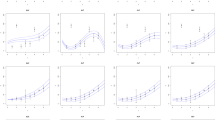Abstract
In this paper, a new approach is presented to fit a fuzzy regression model with the fuzzy coefficients when the explanatory variables and the response variable are as fuzzy numbers. In this approach, a nonlinear function is introduced to predict the response variables based on the kernel function. To estimate the parameters of regression model, the objective function is calculated using the quantile loss function on fuzzy numbers. To evaluate the goodness of fit of the optimal quantile fuzzy regression models, two indices are introduced using the similarity measures. Based on the presented results, the proposed fuzzy regression models have the perfect performances on the original data and also in the presences of different types of outliers.


Similar content being viewed by others
Data availability
The data used in the presented work are included within the paper.
References
Akbari MG, Hesamian G (2019) A partial-robust-ridge-based regression model with fuzzy predictors-responses. J Comput Appl Math 351:290–301
Arefi M (2020) Quantile fuzzy regression based on fuzzy outputs and fuzzy parameters. Soft Comput 24:311–320
Arefi M, Taheri SM (2014) Weighted similarity measure on interval-valued fuzzy sets and its application to pattern recognition. Iran J Fuzzy Syst 11:67–79
Arefi M, Taheri SM (2015) Least-squares regression based on Atanassov’s intuitionistic fuzzy inputs-outputs and Atanassov’s intuitionistic fuzzy parameters. IEEE Trans Fuzzy Syst 23:1142–1154
Asadolahi M, Akbari MGh, Hesamian G, Arefi M (2021) A robust support vector regression with exact predictors and fuzzy responses. Int J Approx Reason 132:206–225
Bargiela A, Pedrycz W, Nakashima T (2007) Multiple regression with fuzzy data. Fuzzy Sets Syst 158:2169–2188
Chachi J (2019) A weighted least-squares fuzzy regression for crisp input-fuzzy output data. IEEE Trans Fuzzy Syst 27:739–748
Chachi J, Taheri SM (2016) Multiple fuzzy regression model for fuzzy input-output data. Iran J Fuzzy Syst 13:63–78
Chachi J, Taheri SM, Fattahi S, Ravandi AH (2016) Two robust fuzzy regression models and their applications in predicting imperfections of cotton yarn. J Textiles Polym 4(2):60–68
Chen SP, Dang JF (2008) A variable spread fuzzy linear regression model with higher explanatory power and forecasting accuracy. Inf Sci 178:3973–3988
Choi SH, Yoon JH (2010) General fuzzy regression using least squares method. Int J Syst Sci 41(5):477–485
Diamond P (1988) Fuzzy least squares. Inf Sci 46:141–157
Diamond P, Korner R (1997) Extended fuzzy linear models and least squares estimates. Comput Math Appl 33(9):15–32
D’Urso P, Massari R (2013) Weighted least squares and least median squares estimation for the fuzzy linear regression analysis. Metron 71:279–306
D’Urso P, Massari R, Santoro A (2011) Robust fuzzy regression analysis. Inf Sci 181:4154–4174
Hao PY, Chiang JH (2008) Fuzzy regression analysis by support vector learning approach. IEEE Trans Fuzzy Syst 16:428–441
Hesamian G, Akbari MG (2019) Fuzzy quantile linear regression model adopted with a semi-parametric technique based on fuzzy predictors and fuzzy responses. Expert Syst Appl 118:585–597
Hesamian G, Akbari MG (2021) A robust multiple regression model based on fuzzy random variables. J Comput Appl Math 388:113270
Huber PJ (1981) Robust statistics. Willey, New York, pp 153–195
Jung HY, Yoon JH, Choi SH (2015) Fuzzy linear regression using rank transform method. Fuzzy Sets Syst 274:97–108
Khammar AH, Arefi M, Akbari MG (2020) A robust least squares fuzzy regression model based on kernel function. Iran J Fuzzy Syst 17:105–119
Khammar AH, Arefi M, Akbari MG (2021) A general approach to fuzzy regression models based on different loss functions. Soft Comput 25:835–849
Khammar AH, Arefi M, Akbari MG (2021) Quantile fuzzy varying coefficient regression based on kernel function. Appl Soft Comput J 107:107313. https://doi.org/10.1016/j.asoc.2021.107313
Koenker R (2005) Quantile regression. Cambridge, New York
Kula KS, Tank F, Dalkyly TE (2012) A study on fuzzy robust regression and its application to insurance. Math Comput Appl 17:223–234
Mangasarian OL, Musicant D (2000) Robust linear and support vector regression. IEEE Trans Pattern Anal Mach Intell 22:950–955
Rapaic D, Krstanovic L, Ralevic N, Obradovic R, Klipa C (2019) Sparse regularized fuzzy regression. Appl Anal Discrete Math 13:583–604
Roldan C, Roldan A, Martanez-Moreno J (2012) A fuzzy regression model based on distances and random variables with crisp input and fuzzy output data: a case study in biomass production. Soft Comput 16:785–795
Lopez R, de Hierro AF, Martinez-Morenob J, Aguilar-Pena C, Lopez Roldan, de Hierro C (2016) A fuzzy regression approach using Bernstein polynomials for the spreads: computational aspects and applications to economic models. Math Comput Simul 128:13–25
Schrage L (2006) Optimization modeling with Lingo, 6th edn. Lindo Systems, Chicago
Taheri SM, Kelkinnama M (2012) Fuzzy linear regression based on least absolute deviations. Irannian Journal of Fuzzy Systems 9:121–140
Wasserman L (2006) “All of nonparametric statistics”, Springer Science & Business Media
Wolfram S (2003) The Mathematica Book, 5th edn. Wolfram Media Inc, USA
Xu R, Li C (2001) Multidimensional least-squares fitting with a fuzzy model. Fuzzy Sets and Systems 119:215–223
Yu W (2010) Fuzzy modelling via on-line support vector machines. International Journal of Systems Science 41(11):1325–1335
Zeng W, Feng Q, Lia J (2016) Fuzzy least absolute linear regression. Applied Soft Computing 52:1009–1019
Zimmermann HJ (2001) Fuzzy Set Theory and Its Applications, 4th edn. Kluwer Nihoff, Boston
Funding
The authors have not disclosed any funding.
Author information
Authors and Affiliations
Corresponding author
Ethics declarations
Conflict of interest
The author declares that there is no conflict of interest regarding the publication of this paper.
Ethical approval
This article does not contain any studies with human participants or animals.
Additional information
Publisher's Note
Springer Nature remains neutral with regard to jurisdictional claims in published maps and institutional affiliations.
Rights and permissions
Springer Nature or its licensor (e.g. a society or other partner) holds exclusive rights to this article under a publishing agreement with the author(s) or other rightsholder(s); author self-archiving of the accepted manuscript version of this article is solely governed by the terms of such publishing agreement and applicable law.
About this article
Cite this article
Arefi, M., Khammar, A.H. Nonlinear prediction of fuzzy regression model based on quantile loss function. Soft Comput 28, 4861–4871 (2024). https://doi.org/10.1007/s00500-023-09190-w
Accepted:
Published:
Issue Date:
DOI: https://doi.org/10.1007/s00500-023-09190-w




